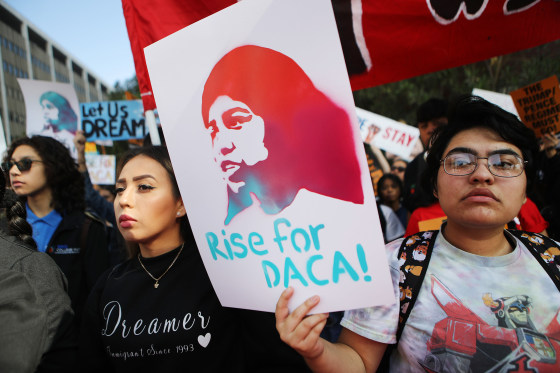
Over 100,000 young immigrants without health insurance will now be able to buy affordable health care through the plan, the administration estimates.

Demonstrators in Los Angeles rally in support of DACA recipients on the day the Supreme Court heard arguments in the DACA case in 2019. Mario Tama / Getty Images file
May 3, 2024, 9:00 AM UTCMore than 100,000 young immigrants protected by the Deferred Action for Childhood Arrivals program will soon become eligible to receive federal health care coverage for the first time since DACA was implemented over a decade ago.
The Biden administration will announce a new federal rule Friday allowing DACA recipients to enroll in a qualified health plan through the Affordable Care Act insurance marketplace or become eligible for coverage through a basic health program.
An estimated 580,000 young adults who lack legal immigration status and have lived in the U.S. since they were children are currently working or studying without fear of deportation under DACA. An overwhelming majority of DACA recipients were born in Mexico and other Latin American countries.
Even though the program has helped them access better-paying jobs and educational opportunities since it was first implemented in 2012, DACA beneficiaries had been barred from accessing federally funded health insurance despite contributing billions in federal taxes, pouring funds into the nation’s federal health insurance system for years.
While many DACA recipients get health insurance through their jobs, more than a quarter are estimated to currently be uninsured.
By implementing a federal rule expanding the definition of “lawful presence” to include DACA recipients, they are “no longer excluded from receiving coverage from a quality health plan and financial assistance as well,” Health and Human Services Secretary Xavier Becerra told reporters in a press call Thursday.
The U.S. Department of Health and Human Services estimates that over 100,000 young immigrants who lack health insurance will now have a shot at accessing affordable health care.
“DACA recipients are currently three times more likely to be uninsured than the general U.S. population, and individuals without health insurance are less likely to receive preventative or routine health screenings. They delay necessary medical care, and they incur higher costs and debts when they do finally see care,” Becerra said, adding the new expansion “will improve their health and will strengthen the health and well-being of our nation.”
The new federal rule does not make DACA recipients eligible for the Medicaid program, according to senior administration officials, but gives them coverage through the Affordable Care Act and its marketplaces and financial assistance programs.
The announced rule is expected to go into effect Nov. 1, which coincides with the Affordable Care Act’s open enrollment period for 2025 health insurance plans, allowing newly eligible DACA recipients to have access to federal health care as early as December, according to HHS.
Friday’s announcement comes about a year after President Joe Biden first announced his administration’s plan to expand health care coverage to DACA recipients. The administration’s original plan aimed to implement the federal rule by November 2023.
Senior administration officials declined to comment this week on why the implementation of the rule was delayed.
However, White House domestic policy adviser Neera Tanden stressed that “the president will continue to fight” for DACA recipients, adding that “only Congress can provide them permanent status and a pathway to citizenship.”
While the program has been around for a decade, it faced legal challenges during the Trump administration and from Republican-led states. DACA has been closed to new registrants since July 2021 as lawsuits challenging the program continue making their way through the courts.
Nicole Acevedo is a reporter for NBC Latino.